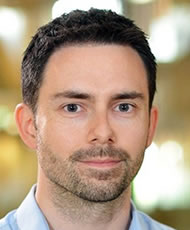David Payne MEng Electronic Engineering, 2009
PhD in Electronics and Electrical Engineering, 2014

I currently hold a full-time faculty funded lecturer position in the school of Engineering at Macquarie university, Australia. In this role my time is split evenly between teaching and research. I’m enjoying the chance to get more involved with teaching as I have been primarily research focussed up till now.
Southampton University has a good reputation for electronic engineering and this leads to an immediate level of trust and respect from new co-workers and collaborators which I have found helpful in accelerating career opportunities and progression.
My experience of studying at Southampton
I began my PhD around the time that the new ECS cleanrooms were coming online. This was quite fortunate for me as these labs had brand new, top of the range equipment, supported by good technicians. I knew that ECS/Southampton had good facilities, but I was only truly able to appreciate just how good they were towards the end of my PhD and the subsequent years after, in which I gained experience working in other leading laboratories. I found that very few labs matched the high-quality facilities that ECS had to offer.
I chose to do my PhD at ECS because I wanted to continue to develop my knowledge of technology and to focus on an area that had real potential for making a positive impact. I knew professor Bagnall as he had lectured several of the undergraduate courses that I found most interesting. I therefore chose to carry out my master’s year thesis project within his group, where I worked closely with his team of excellent PhD students and postdocs. During that time, I was inspired to take up a PhD and to continue down an academic path.
I was fortunate to have been offered numerous brilliant opportunities during my time as a postgraduate at Southampton. I was encouraged to attend conferences and was able to attend my first two within year one of my PhD. This included a UK conference in which I won the best paper award, and an international conference located in Hawaii, a fantastic destination and a great networking opportunity! Later, in my PhD I was also awarded a summer fellowship award from the Japanese Society for the Promotion of Science (JSPS). This allowed me to spend 3 months in Japan at the Tokyo university of agriculture and technology. That trip was a real highlight for me as I had a unique opportunity to see how research is carried out in a very different culture to the one I was used to, and Japan remains my favourite destination to this day.
What I liked about living and studying in Southampton
I found that Southampton had a strong student community, for both undergraduates and postgraduates. There are plenty of societies and sporting groups to join and a regular cake and coffee event to encourage networking amongst PhDs. This social side really helps when working on PhD level research which is of course time-consuming and can become isolationist. It also helped to generate a network of peers which come in very useful when looking for employment and collaboration.
My advice to new students
Make the most of the excellent resources and opportunities that ECS has to offer. To utilise the strong links that ECS has with many other institutes, programs and people around the world to seek out collaborations and fellowship opportunities. This can be hugely beneficial towards both career and personal development and will lead to more options when it comes to employment after your studies.
Put some time towards building a good network of peers. Attend conferences when possible, socialise, and reach out to respected academics in your field. I believe that academics should be working together to solve the big problems and building good working relationships across your field will vastly improve your collaboration and future employment opportunities.